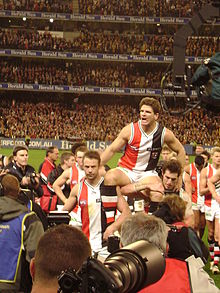| Revision as of 10:07, 20 October 2017 edit110.141.199.57 (talk)No edit summaryTags: Visual edit Mobile edit Mobile web edit← Previous edit | Revision as of 10:27, 20 October 2017 edit undoThe Drover's Wife (talk | contribs)Autopatrolled, Extended confirmed users, New page reviewers, Pending changes reviewers42,654 editsm Reverted 2 edits by 110.141.199.57 (talk) to last revision by 121.214.96.155. (TW)Next edit → | ||
| Line 222: | Line 222: | ||
| |]||{{sortname|Patrick|Dangerfield}}||{{AFL Gee}}||35 | |]||{{sortname|Patrick|Dangerfield}}||{{AFL Gee}}||35 | ||
| |- | |- | ||
| |]|| |
|]||{{sortname|Dustin|Martin}}||{{AFL Ric}}||36 | ||
| |} | |} | ||
Revision as of 10:27, 20 October 2017
The Brownlow Medal (formally the Charles Brownlow Trophy) is an individual award given to the player judged fairest and best in the Australian Football League (AFL) during the regular season. Determined by votes cast by the officiating umpires after each game, it is considered the highest honour for individual players in the AFL.
The medal has been awarded every year since 1924, with the exception of an intermission from 1942–1945 due to World War II. As of 2017, the Brownlow Medal has been awarded 104 times to 86 different players in 90 medal counts.
Winners by season








Medal was awarded retrospectively, as a countback rule was enforced until 1980.
No winner was actually declared in 1940, with Des Fothergill and Herbie Matthews recognised retrospectively as joint winners in 1989 after having initially received replica medals.
The voting system in 1976 and 1977 had both field umpires awarding votes, resulting in higher vote tallies than other years.
As a mark of respect to soldiers fighting overseas in World War II between 1942 and 1945, the medal was not awarded during this time.
Ineligible players who polled the most votes
A player guilty of an offence deemed worthy of a suspension by the AFL's disciplinary tribunal for serious on-field offences is ineligible to win the Brownlow Medal. Suspended players have tallied the highest number of votes for the award on three occasions. In the third of those cases, Jobe Watson, who won in 2012, was later found guilty of breaching WADA's anti-doping code in the 2012 season, and was retrospectively ruled ineligible by the AFL Commission in November 2016.
| Player | Team | Year | Votes | Outcome |
|---|---|---|---|---|
| Corey McKernan | North Melbourne | 1996 | 21 | Suspended; would have been joint winner with Hird and Voss. |
| Chris Grant | Western Bulldogs | 1997 | 27 | Suspended; would have won outright, beating Harvey by one vote. |
| Jobe Watson | Essendon | 2012 | 30 | Awarded the medal in 2012, beating Mitchell and Cotchin by four votes. In 2016 he was retrospectively ruled ineligible because of being suspended for using a banned substance, as part of what is known as the Essendon supplements saga. |
Multiple winners
The following players have won the Brownlow Medal multiple times.
| Medals | Player | Team | Seasons |
|---|---|---|---|
| 3 | Haydn Bunton Sr. | Fitzroy | 1931, 1932, 1935 |
| Dick Reynolds | Essendon | 1934, 1937, 1938 | |
| Bob Skilton | Sydney Swans | 1959, 1963, 1968 | |
| Ian Stewart | St Kilda / Richmond | 1965, 1966, 1971 | |
| 2 | Ivor Warne-Smith | Melbourne | 1926, 1928 |
| Bill Hutchison | Essendon | 1952, 1953 | |
| Roy Wright | Richmond | 1952, 1954 | |
| Keith Greig | North Melbourne | 1973, 1974 | |
| Peter Moore | Collingwood / Melbourne | 1979, 1984 | |
| Greg Williams | Sydney / Carlton | 1986, 1994 | |
| Robert Harvey | St Kilda | 1997, 1998 | |
| Adam Goodes | Sydney | 2003, 2006 | |
| Chris Judd | West Coast / Carlton | 2004, 2010 | |
| Gary Ablett Jr. | Geelong / Gold Coast | 2009, 2013 |
Voting systems
Main article: Brownlow MedalSince 1924, the voting system for the Brownlow has changed three times.
| 1924–1930 | One vote per game |
| 1931–1975, 1978–present | Six votes per game: 3 votes, 2 votes, and 1 vote |
| 1976–1977 | Twelve votes per game: 3 votes, 2 votes, and 1 vote from each of the two field umpires |
The length of the home and away season has also changed since 1924.
| 1924 | 16 games |
| 1925 | 17 games |
| 1926–1941, 1950–1967 | 18 games |
| 1946–1949 | 19 games |
| 1968–1969, 1993 | 20 games |
| 1970–1992, 1994–present | 22 games |
From 1930 to 1980, a countback system was used to determine the winner in the event of a tie. In 1930, Judkins was awarded the medal as he had played in the fewest games.
From 1931 to 1980, with the introduction of 3-2-1 voting, the winner was the player with the most three-vote games. In 1980, the countback system was removed, and in the event of a tie, players hve been considered joint winners. In 1989, the then VFL awarded retrospective medals to all players who had tied but lost on countback prior to 1980.
See also
Notes
- Sean Miller. "What makes the Brownlow so special?". Premier Media Group. Retrieved 15 November 2008.
- ^ "Brownlow Medal – AFL Brownlow Medal". Australian Football League. Retrieved 15 November 2008.
- "AFL Commission statement on 2012 Brownlow Medal". Australian Football League. 15 November 2016. Retrieved 15 November 2016.
- "1980–1989". AFL BigPond Network. 11 December 2006. Retrieved 10 July 2011.
External links
| Australian rules football | |||||||||||
|---|---|---|---|---|---|---|---|---|---|---|---|
| Leagues and competitions |
| ||||||||||
| History | |||||||||||
| Variations | |||||||||||
| Geography | |||||||||||
| Awards | |||||||||||
| Related articles | |||||||||||